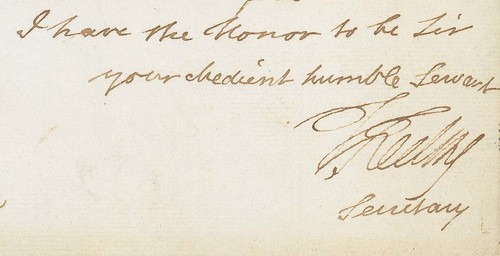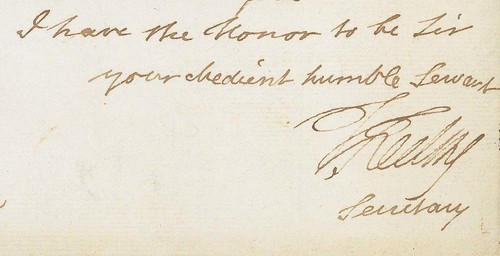Auction: 17020 - Autographs, Historical Documents, Ephemera and Postal History
Lot: 891
Autographs
Francis Freeling
1815 (November) two A.L.S. to I. Low, Deputy Commissary General in Canterbury as Secretary of the General Post Office. The letters refer to a postage charge of £22 on a package addressed to Sir Thomas Picton (who had been killed at the Battle of Waterloo). The first letter requests that the package be sent to London so an abatement to the charge could be made, the second, written two days later, "On opening the Packet addressed to the late Sir Thomas Picton its contents prove to be merely a set of maps and I and very glad that the circumstances you have narrated enable ne to gratify my feelings of respect for the memory of this lamented officer by ordering the Postmaster of Canterbury to deliver it to you free of any charge whatsoever". Both letters signed "F. Freeling". Photo
Sir Francis Freeling (1764 – 1836), was Secretary of HM General Post Office. Freeling started work in the Bristol Post Office. In 1785 he was promoted, to a post in London, to develop the service. In 1797, he rose to the office of joint Secretary to the Post Office and in 1798, sole Secretary. He initiated many reforms to the Post Office, including the introduction of local penny posts in large towns, the reorganization of London's postal service and the use of steam trains and steamships to replace horse-drawn vehicles and wind-powered ships.
Lieutenant-General Sir Thomas Picton (1758 – 1815) a Welsh officer of the British Army, fought in a number of campaigns for Britain in the Napoleonic Wars. According to the historian Alessandro Barbero, Picton was "respected for his courage and feared for his irascible temperament". The Duke of Wellington called him "a rough foul-mouthed devil as ever lived", but found him capable. He is chiefly remembered for his exploits under Wellington in the Iberian Peninsular War of 1807–1814, during which he fought in many engagements, displaying great bravery and persistence. He was killed in 1815 fighting at the Battle of Waterloo, during a crucial bayonet charge in which his division stopped d'Erlon's corps' attack against the allied centre left. He was the most senior officer to die at Waterloo.
Subject to 20% VAT on Buyer’s Premium. For more information please view Terms and Conditions for Buyers.
Sold for
£150







